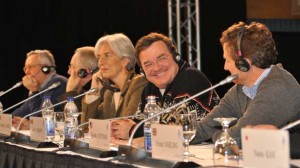Iqaluit pulled it off, with ease.
The financial world’s biggest power brokers – from World Bank President Robert Zoellick to U.S. Treasury Secretary Tim Geithner – came and went during the two-day G7 finance ministers’ summit without a hitch.
Other than a slight slowdown in their Internet speed, most of the residents in this small sub-arctic town weren’t negatively affected by the flurry of closed door meetings and cabal of Canadian and international journalists in tow.
The entire summit lasted less than 24 hours. When it was over, the community poured into the town’s high school for eating and dancing. Finance Minister Jim Flaherty thanked local citizens in Inuktitut, winning warm applause, and he received a new seal skin vest.
This summit could easily have gone very wrong for Mr. Flaherty. The logistics were almost as challenging as the policy items on the agenda. Arctic storms regularly cancel flights in Iqaluit, running the risk that ministers would not be able to leave on time. Yet Mr. Flaherty was determined to set the G7 on a more casual track and the setting appears to have worked.
“Coming to the cold and to this beautiful city makes the whole thing a lot warmer,” said French finance minister Christine Lagarde.
As an added bonus for Mr. Flaherty, the trip led to international media reports on two of the Conservative government’s key priorities: the expanding mining opportunities in Nunavut and Canada’s active assertions of sovereignty over the Northwest Passage.
It was noticed, though barely, that none of the foreign ministers or bankers took up Mr. Flaherty’s invitation to stay a couple of hours longer to join the community for “country foods” like seal meat, caribou and arctic char.
“We’re quite proud,” said Elisapee Sheutiapik, the mayor of Iqaluit, who said the foreign visitors likely had an experience of a lifetime. Yet she expressed some disappointment that none of them came to the country dinner.
The only G7 participant to join Mr. Flaherty at the community event was Bank of Canada ![[]](http://images.intellitxt.com/ast/adTypes/mag-glass_10x10.gif) Governor Mark Carney, who appeared to enjoy taking part in the group games.
Governor Mark Carney, who appeared to enjoy taking part in the group games.
“It would have been a great opportunity for them to see that a gathering like this is amazing,” Ms. Sheutiapik said. “It’s a small delegation. It’s better than nothing.”
The Inuit followed through with their plan to showcase the importance of seal meat to their local culture. Their campaign was highly visible and not the least bit aggressive. Virtually everywhere the visitors went, there was seal skin. Outside the Nunavut legislature – which served as the main venue for the G7 meeting – an igloo was set up with a seal skin drying outside.
The seal harvest is a top of mind issue for Inuit given that the European Union ![]() is about to implement an import ban on seal products. The ban includes a specific exemption for the Inuit, but they dismiss the exemption as inadequate.
is about to implement an import ban on seal products. The ban includes a specific exemption for the Inuit, but they dismiss the exemption as inadequate.
Several of the European visitors gladly took up Mr. Flaherty’s call to go dog-sledding and some checked out the igloo, but the seal issue clearly made them uncomfortable.
When an Iqaluit-based reporter twice asked the European ministers to comment on whether the visit changed their view on the seal hunt, the European ministers turned both times to Canada’s finance minister to answer the questions.
Ms. Lagarde, the French finance minister, would later thank Mr. Flaherty for handling the seal questions for them.
Though it was not clear whether he was speaking directly about seals, German finance minister Wolfgang Schaeuble intervened near the end of the news conference to say the unique local had in fact impacted his view of Canada’s north.
“I would say I was deeply impressed by this region and by this city and by the great hospitality we enjoyed,” he said. “Of course it has changed my view of this part of the world. I’ll be very frank about that – and I will not forget it.”
Take our FREE Online Assessment Today!
Socialize with Abrams & Krochak

